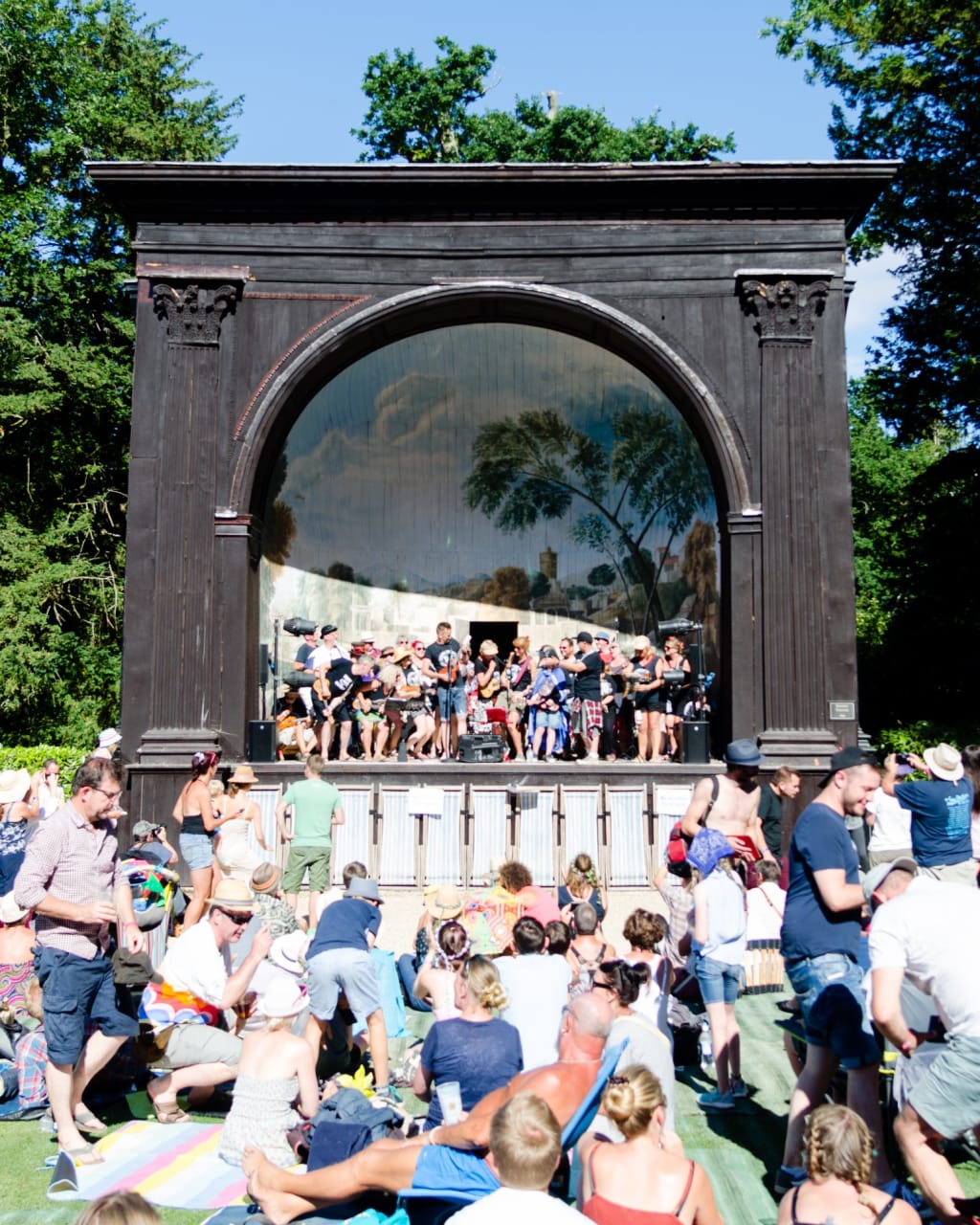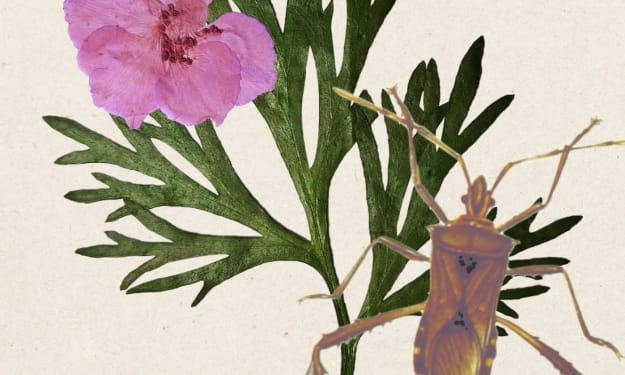Larmer Tree Festival - one of England's best kept secrets.
A magical event in the heart of the mystical, ancient West Country of England

One of England’s best kept secrets, Larmer Tree Festival is the event of the year for me. A great opportunity to meet friends hang out listening to good music, eat delicious food from all over the world and drink great cider and beers. Held at the Larmer Tree Gardens in England, at Tollard Royal in the Cranborne Chase on the Wiltshire / Dorset border. An area of outstanding natural beauty between Salisbury and Blandford Forum. Stonehenge, Glastonbury, Earthwise, Endorse-it-in-Dorset and many other festivals have been held in this small but historically packed area of England, where the affluent and busy South East changes to a lush green land of fields, hedgerows and woodland, undulating low hills and plains with long barrows (Neolithic burial mounds), barrows (bronze age burial mounds), standing stones, thatched cottages and Inns, ancient oak trees and farmland. My own family history has been traced back to nearby Shrewton, a small village where the local Parish churchyard has many Vallis graves. An unusual name with only two or three in any phone directory. There is even a grave for John Vallis, who lived in the late 18h / early 19th century and was a an agricultural labourer, pre-mechanisation. He would have scythed the wheat at harvest time on the open fields of the Salisbury Plain, baled the straw by hand for thatching and no doubt swilled the local scrumpy, a cloudy cider of unknown strength that this corner of England is famous for, made from the plentiful apples from the many orchards in the area. England has over 3000 varieties of apples, some sweet, some only good for cooking and some perfect for making scrumpy.
This area is also said have many “ley lines” crisscrossing this area between areas of ancient significance and I can feel the earth energy and ancient vibrations when I go there. This area has a unique atmosphere and feel, unlike anywhere that I have ever been to on this planet. Maybe because I am connected to this land through ancestors who lived here for many hundreds of years, or maybe because it is here that the energy of the earth and the connection with our ancient past is at its strongest.
Larmer Tree Festival and the more Indie band based “End Of The Road Festival” are held at the Larmer Tree House estate in July and September. A Stately Home and Gardens in Cranborne Chase, an area of natural beauty that overlaps the English counties of Wiltshire, Dorset, Hampshire and Somerset. It has ancient woodlands, chalk escarpments, downland and chalk river valleys. The gardens were created by the distinguished archaeologist General Pitt-Rivers in 1880 and are an extraordinary example of Victorian extravagance and vision. Designed to be a pleasure ground for “public enlightenment and entertainment” they were the first privately owned park in England to be opened to the public. The gardens hold a unique collection of ornate buildings, a water garden, landscaped open meadowlands and manicured lawns. Majestic trees were planted and they create intimate arbors of secrecy and surprise with hidden paths, dark forest corners and openings, These all come to life during the festival when the trees in the woodland area are hung with home-made lanterns, fairy lights, musical instruments and a diverse variety of weird and wonderful ornamentation. Open lawns would have provided areas for reception drinks, entertaining guests and playing croquet with the folly buildings such as The Singing Theatre and The Roman Temple adding atmosphere, interest and beauty. During the festivals they are areas to picnic between bands and sit or stand to watch the shows on the main stage and the ornate garden stage to the side with its semi-circular construction and Italianate Renaissance Fresco. Peacocks and Macaws roam and fly freely in the gardens with the Peacocks choosing the main lawn with its ornate follies as their territory.
This area has the largest number of prehistoric and bronze age tumuli in England. The grand-daddy of them all and supposedly the center of all earth energies and lay lines, is Stonehenge, the center of religious and spiritual Neolithic culture in the whole of England. Stonehenge is only 26 miles from Larmer Tree House the route passes through Shrewton, the village of my ancestors on my father’s side. They left the land at the beginning of the Industrial Revolution in England when farms were becoming mechanized and the thousands of farm laborer’s like my forefathers were no longer required. This mechanization and consequential job losses and pay cuts led to the Swing Rebellion of 1830, which swept through southern England east to west, from Kent, where it started, to Wiltshire and Dorset, where it gained great momentum and energy. Incidents in Puddletown in Dorset involved farm workers who were later to join the Tolpuddle Union. During the Swing Rebellion there were attacks by farm workers on their employers and on farm equipment. Some employers raised pay (or did not cut it) for fear of attack. Other attacks were headed off with one off payments of beer. Soon, however, fear of attack turned to determination to crush the rebels and special Constables and Militia were recruited to suppress the uprising. The farm laborers were no match for the armed soldiers and the ring leaders were soon arrested. Special courts dealt with the hundreds of men who were arrested. Some were sentenced to hang at the gallows, but most avoided execution by being transported to Australia instead: A favored punishment for violent and petty thief criminals in England at the time.
The festival is limited to 5000 people per day so that it does not feel too crowded. It is one of the most relaxed and family-friendly festivals in England running for four days every year (except 2020 because of the Covid-19 pandemic and whenever the organizers want to take a year off) with comedy, performing arts and music. From quirky amateur performances on the smaller stages and in the outdoor performance zones to big name bands and comedians on the main stage (with full light and audiovisual displays) and equally professional bands in the big top and Village Inn (beer tent) through the afternoon and evening. Not just local and national talent but international artists as well. Big names such as The Stranglers, Tom Jones, Paloma Faith, Gomez, Kate Tempest and Bill Bailey have done sets here along with local and international talent that has not yet made the big time and fringe theatre. The discovery of unknown acts is the best part of the festival for me. It is here that I experienced The Antipoets (two English goth guys dressed in black leather, tattoos and black nail varnish who are masters of beatrantin’ rhythm and views), The Dukebox (3 guys with acoustic guitars crammed into a very small caravan with old 1950s jukebox stuck on the front, the sit stock still until someone presses the name of a record and then they burst into life and sing it) and Simon Panrucker’s keep fit Fandango (Bristol’s bassiest exercise group, “here to help you lose troubles, your marbles and your calories in a riot of dance, color and electronic beats”).
I am proud to say that Southampton Ukulele Jam, the musical collective that I have been in since 2008, has played this festival three times and are a crowd favorite. In a small crack team of 30, we roam around the festival armed with loaded ukuleles, ready to burst into a pop hit like Lady Gaga’s Poker Face, The Killers Mr Brightside or the Vaccines “If You Wanna”. We also play shows in the performance areas of the main arena and in The Lost Woods, which appear on the Festival timetable. We invite the audience to sing along, ending with an everyone physically jumping up and down rendition of The Clash’s Should I Stay or Should I go. The answer is always “Go, Southampton Ukulele Jam, Go!!”). At the campfire session in the Lost Woods (part of the dense arboretum that Pitt Rivers planted 150 years ago) we always end with a tear jerking and poignant version of Elbow’s One Day Like This, where the audience of over a hundred people packed into this small space sing their hearts out making the hairs on the back of everyone’s neck’s tingle.
It is against this backdrop of music, arts, comedy, international cuisine, secret gardens, croquet lawns and English Victorian eccentricity and that I met William. The incredibly talented and once famous guitarist from Harare. It was July 2008, and he was playing with a Zimbabwean band called Chimanimani, named after a range of hills, that are sacred in the Zimbabwean Shona culture. They were part of International talent showcasing their talent that year, but the only African band in the whole weekend. I remember it like it was yesterday. They played in the Big Top tent early on the Friday evening, just after we had pitched up and wandered into the festival grounds to grab a pint of Cranborne Chase cider and a Vegetarian Thali from one of the Indian food stalls.
The band blew me away with their incredibly danceable rhythms, chiming melodic guitarwork and pumping bass. I danced like no-one was watching for an hour and did not want it to end. After the show I approached the band to know more about them and was welcomed with a big smile from the lead guitarist. An older guy with greying short afro and a statesmanlike white short goatee beard, We hit it off instantly and started to chat about the style (Sunguru), the chords and riffs that he used (I am a guitarist of many years) and any future shows that were planned that year. It was a fateful meeting and the start of a life-long friendship and musical collaboration and many adventures in the UK and Africa.
John Vallis December 2020
See my next articles on:
1. Southampton Ukulele Jam - the family of 300 who are united by the love of playing punk and pop songs on this tiny instrument and singing together. A triumph of enthusiasm over musical ability.
2. The Ley Line Theory of Mother Earth’s energy lines.
3. William and Me – the true stories of my recent musical adventures with Zimbabwean’s in UK and Malawi.
About the Creator
John Vallis
Dad, uncle, Traveller, guitarist, academic, conservationist, environmentalist and wastewater engineer by trade.






Comments
There are no comments for this story
Be the first to respond and start the conversation.